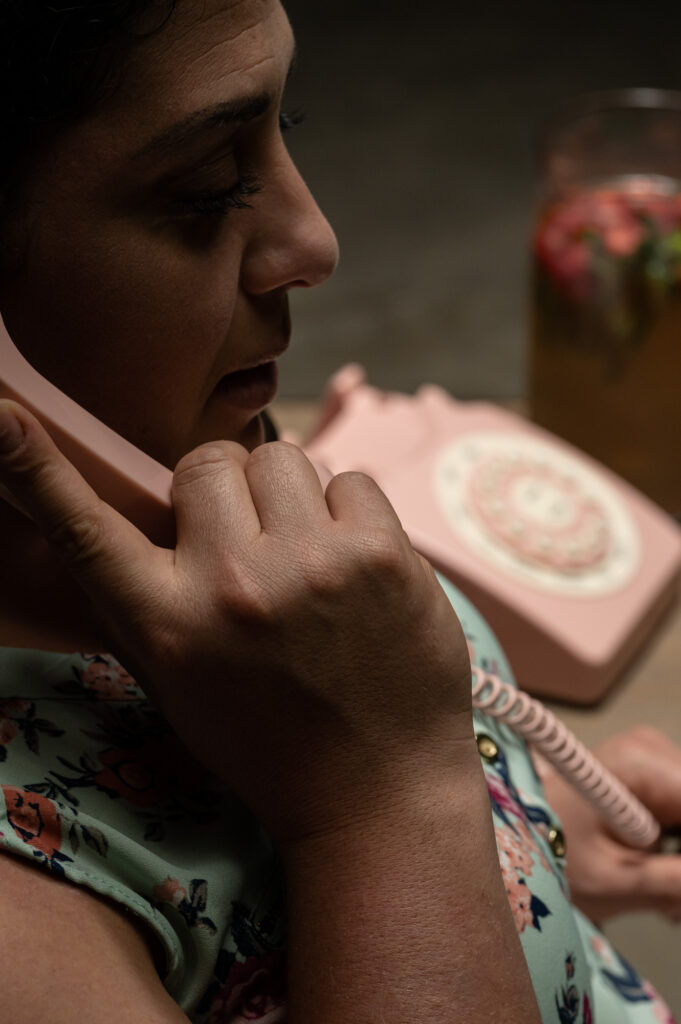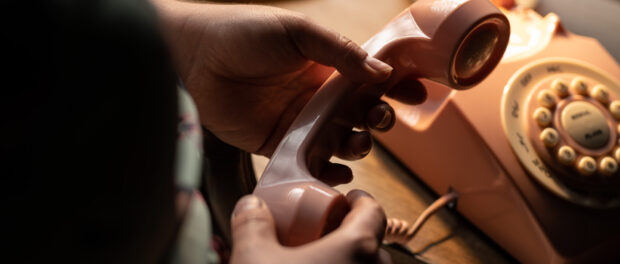Phone to Theatre : Soon, Tomorrow Maybe
Of the many creative adaptions to lockdown life, one extremely successful pivot was the play Tantôt, demain peut-être. Initially intended as a stage production, owing to the pandemic lockdown, the show was instead performed over the phone and enjoyed over 125 sold out performances since its release in 2020. Writer and director, Marie Ayotte is now offering an English translation, Soon, Tomorrow Maybe. In the show, the “spectators” converse over the phone with Helen (played by Natalie Tanous, Leigh Ann Tyalor, and Alexandra Bandean) about her day-to-day life and her greatest regret: choosing motherhood. Through the conversation that develops, Helen asks her for understanding and seeks redemption, one person at a time.
The motivation for the piece came from a conversation Ayotte had with a friend who said she loved her children unconditionally but felt trapped by motherhood and regretted it. “I didn’t know how to answer her,” Ayotte says. “I said, I hear you, I want to help you, but I don’t know what to say.” Her friend revealed that she felt judged by others and couldn’t talk to them about it. The conversation got Ayotte thinking about how many people were in the same position as both her friend and herself. “If someone else was told this, I wanted to help them find out how to respond.”
Ayotte did three years of research on the topic of the difficulty of motherhood, speaking with over 30 women and delving into the psychology of motherhood. Her own work to become a therapist also informed her research. Through this work, she created the character of Helen.

Ayotte explains some of the things that make this show special. According to her, Soon Tomorrow Maybe, is a participatory play, where audience members are free to interact with Helen or just listen to her story. While this allows each performance to be unique, it is not an improv piece. “There’s a fixed text, but it allows the spectator to talk as much as he or she wants,” says Ayotte. In consequence, the run time can go anywhere from an hour to an hour and a half. “It depends on the participants.”
According to Ayotte, people respond strongly to the show even though it is delivered over the telephone. She says, “Some people cry during the production. Some men didn’t know regretting motherhood was a possibility. Some people have mothers who died, and the show makes them think about their mothers and the experiences of their mothers. There’s a lot of reactions. It’s different for every person.”
Putting together a production done over the phone comes with challenges. For example, the show can only be performed for one person at a time, so Ayotte relies on three actresses to play Helen, allowing up to three productions simultaneously (only two happen at a time, though, as it is an emotional and demanding production). “I really try to direct each actress to have their own flavor and their own style, and it’s different depending on which actress you talk to,” Ayotte says. Further, the rehearsals weren’t held in person. Ayotte directed her actresses over the phone, without seeing them and focused on making the conversation seem natural and believable. Voice was critical.
Another problem to work with is the audiences themselves. While the format makes it easy for people to attend a production without leaving home, Ayotte knows that people aren’t used to phone theatre. “Audiences feel shy to be interactive during the play,” she says, but she seems certain that this was an ideal choice for the participatory theatre. She notes that the phone “respects the limits of the actor and the spectator as well. Everyone is okay, and feels safe. It’s therapeutic too. Because people are moved or angry, they feel safe without showing their face. They feel safe just to talk about it and make their opinion heard. And with the phone we can have that anonymity.”
Spectators only share their first name and phone number when booking a ticket. The actress that calls does so at a pre-booked time from a blocked phone number. Audience members also email ahead of time that gives guidance on how the show will run.
Ayotte concludes by saying, “We want to make sure that we represent the situation with respect and it’s important for us that we’re not there to judge. We make sure that other people understand the situation and they don’t feel alienated or alone.”
Both French and English productions are being offered in September 14th – October 17th by The Théâtre Déchaînés. $1 from each ticket sold goes to the Fondation Mères avec pouvoir, a non-profit organization promoting the autonomy and social and professional integration of women heads of low-income single-parent families, with children from birth to five years old. For more info and to get tickets for the show, click HERE.






